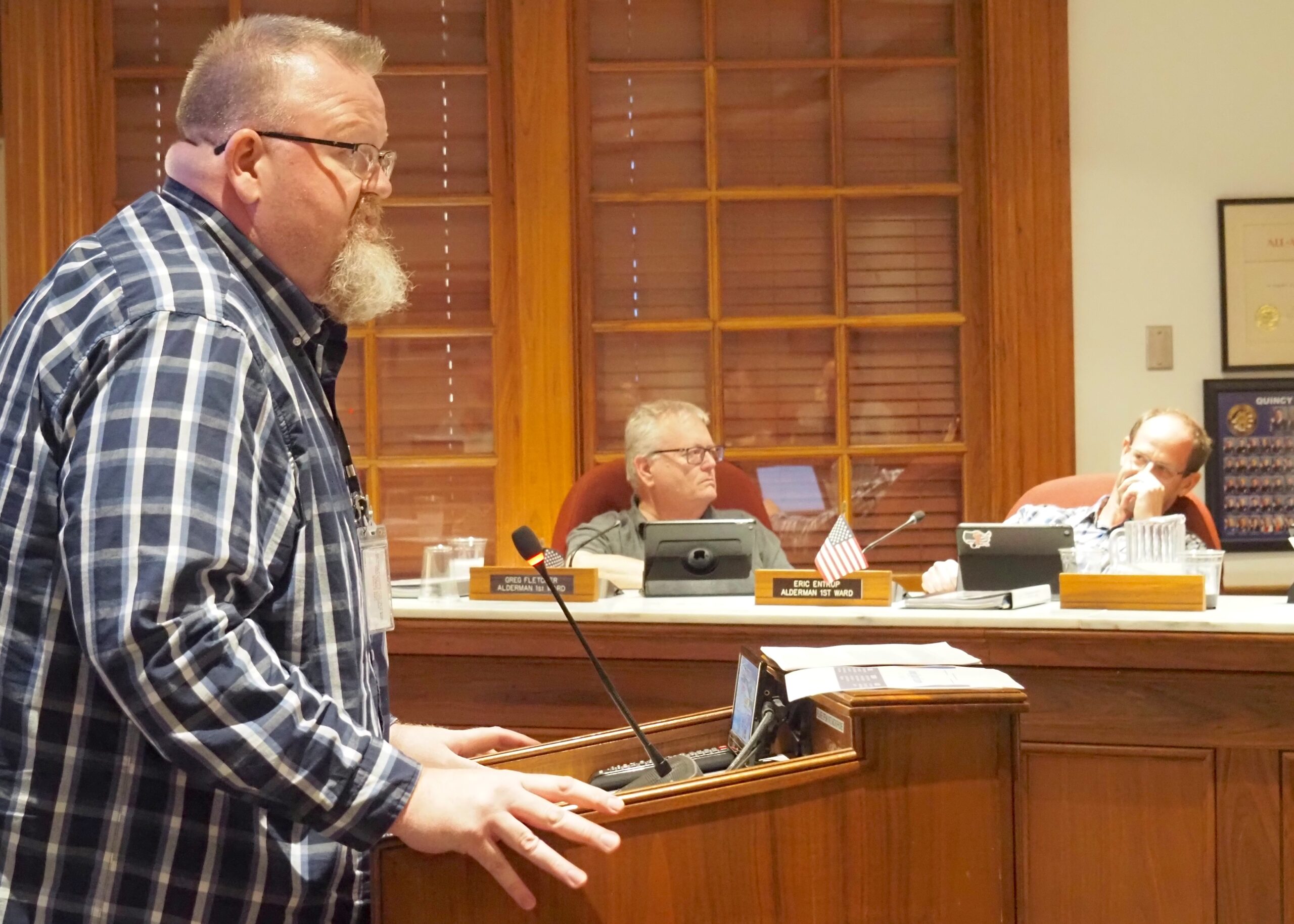Proposed changes to food and beverage tax would focus on tourism instead of retail growth, attracting workers

QUINCY — Director of Planning and Development Jason Parrott made a presentation to the Quincy City Council on Monday night showing the history of how much money the food and beverage tax has created since it was first implemented in May 2020.
The tax is due to expire next month, and Parrott’s presentation showed how the tax could possibly change in the future — if aldermen vote to keep it.
“In talking with our legal department, our best approach was to say, ‘We’re going to present a fresh, clean ordinance,” Parrott said after Monday’s meeting.
The money from the tax previously provided incentives aimed at promoting growth for specific retail needs. Empty big box stores that once housed Sears, County Market, ShopKo and Kmart now are filled by Dunham’s Sporting Goods, Ollie’s, Planet Fitness, R.P. Lumber and Target.
Food and beverage tax dollars also went toward attracting new workers to the city through the Quincy Workforce Relocation Assistance Program (Q-WRAP). Figures provided by Parrott showed 49 percent of the participants were from outside of Illinois, Iowa and Missouri. He said 172 Q-WRAP recipients successfully received a property tax or rent reimbursement, and 166 families are still living and working in Quincy.
The Q-WRAP program ended in April 2024.
Parrott would like to see more of the food and beverage tax dollars directed to tourism efforts. Some already are.
The BET on Q program, launched in May 2021, offers grants for new events in Quincy or for existing events that demonstrate growth or expansion compared to the previous year. LEGUP, which launched in May 2024, supports and enhances legacy events in Quincy that create an impact for visitors and improve the quality of life for residents.
“The primary retail focus of the food and beverage tax was filling the big boxes … but those opportunities are not available any more,” Parrott said. “If somebody else came to town and had a proposal to fill a big box that was an unexpected project like that, we can certainly enter into a development agreement. There’s still that option. But it’s not where the emphasis (of the food and beverage tax) would be.
“We’re kind of moving away from what was there before — the retail, the talent attraction — and really focusing more on those tourism dollars, especially general tourism like we’ve been doing with the Convention and Visitors Bureau and programs like BET on Q and LEGUP. We’re also really looking at that sports tourism opportunity that’s out there.”
Parrott’s figures showed $138.90 million was spent by visitors to Adams County in 2024 and $588.11 million in the past five years.
Parrott’s reference to the sports tourism dollars was regarding a proposed indoor sports complex — to be built at a yet-to-be-determined location — for approximately $30 million to $35 million.
Gary Johnson, director of business development for ARCO National, a construction company from Richmond Heights, Mo., said during a presentation in City Council chambers last week that figuring out what will be included in the proposed facility will determine the cost. For now, the project calls for hardwood floors to accommodate at least eight full-sized basketball courts and double that number for volleyball.
Eric McCafferty with The Sports Facilities Companies, a Clearwater, Fla., company that has developed and operates 75 complexes around the country, said at the meeting that several communities have helped pay for similar facilities by implementing a food and beverage tax.
“I know there’s been a lot of talk, with some saying you have to have a public-private partnership to have one of these facilities,” Parrott said. “Others are saying, ‘I don’t want the city involved in one of these.’ We’re so early in the process here. Right now, the city is generating with roughly $1.7 million a year in food and beverage. BET on Q is getting roughly $150,000 a year. LEGUP is getting roughly $100,000.
“That’s where the additional opportunity comes from. That’s why it’s really looking at the potential of a sports complex to say, ‘Hey, there’s a dedicated revenue stream. Should it be used for a project like this?’ That’s also why we’re looking at without having a sunset clause.”
“In talking to legal when (the proposed ordnance) was being drafted without a sunset clause, the City Council can bring it up in a year, two years, whenever they want to, if they want to do away with it,” Mayor Mike Troup said. “They don’t need a sunset clause to have that discussion.”
Alderman Eric Entrup (R-1) said near the end of Monday’s meeting he likes the idea of keeping an expiration date on that tax.
“Right now, we are debating if we’re going to keep it and what issues we’re going to use it for,” he said. “You never know what issues are going to come at us. To have some sort of timeline to re-look at something like that all the time, so we can’t go past it, I think that’s always a good idea.”
Entrup suggested for some of the food and beverage tax dollars going toward infrastructure or possibly ward funds.
“However we want to do it, I just think that would be something good for us to think about this week,” he said.
Mayor-Elect Linda Moore said after the meeting she believes the food and beverage tax should continue permanently at the current level — at the minimum.
“I like the tourism concept and focusing there, and I’d like to have a piece of it that we could use to somehow reward those businesses that are collecting it, the locally-owned businesses that maybe could just use a little extra oomph in money that would enhance the customer experience,” she said. “Maybe that’s HVAC, maybe that’s roofs, maybe that’s outdoor seating.”
Moore didn’t believe the food and beverage tax should be used to improve streets.
“We all need our streets and roads improved, but I don’t want to put that burden on the backs of our food and beverage companies and businesses,” she said.
She also said she’s not in favor of using taxpayer dollars to fund a venture where a private company will profit.
“That doesn’t feel right to me at all,” Moore said. “(The food and beverage tax) could be a way to help incentivize somebody to make that investment, just like we had an incentive for Target. It could be another mechanism to bring more people and more money to Quincy. To just say, ‘OK, here’s our food and beverage taxes. Go build,’ no, that doesn’t work for me.”
Parrott said the ordinance is written for now to give aldermen the discretion to spend the food and beverage dollars as they see fit.
“If they want to put in something specific that says 50% of this money must go to infrastructure, they could certainly make that amendment (next) Monday night,” he said. “(The aldermen are) the deciding board in this. They can make these decisions on how this works. They could amend it to say, we want to see 30 percent of that funding to go here, 40 percent of that funding to go here and the remaining 30 percent go here. They could certainly do that. If they want to add some details to it, they certainly have that chance.”
In other action, aldermen:
- Approved a special event application from Open Arms Ministries Church requesting permission to hold downtown community outreach services from 11 a.m. to 3 p.m. on May 18, June 22, July 20, Aug. 17, Sept. 21 and Oct. 12. North Sixth Street, from Vermont south to the alley, will be closed on those days.
- Approved the International Association of Machinists & Aerospace Workers Union Local 822 to conduct a raffle and have the bond requirement waived until Aug. 21.
- Approved a variance to allow the Quincy Park District and the Friends of the Lorenzo Bull House,1550 Maine, to install a ground-mounted residential sign closer than 10 feet to any property line. An ordinance granting the variance from zoning regulations will get a second reading next week.
- Heard a proclamation from Troup declaring April 25 as Arbor Day.
- Approved a bid for concrete from R.L. Brink Corporation for $192,065 and patching material from Diamond Construction Company for $37,500 for maintenance of streets and sidewalks.
- Approved payment of an invoice from Quincy University to provide housing and meals for students in the Western Illinois University practicum for $89,175.
- Approved payment of an invoice from the Kansas Fire & Rescue Training Institute to provide the pro-board evaluation of the students in the WIU practicum for $17,400.
Miss Clipping Out Stories to Save for Later?
Click the Purchase Story button below to order a print of this story. We will print it for you on matte photo paper to keep forever.

